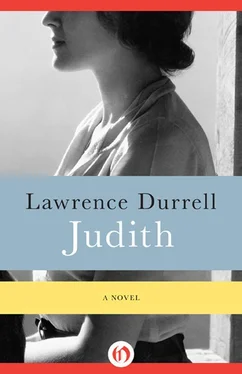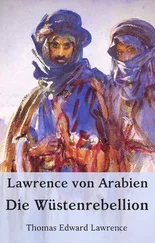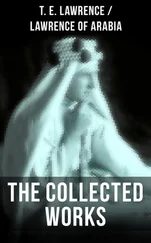It was difficult to know how to reply to this torrent of disconnected phrases, and while Aaron was still hunting for words, Daud clapped his hands and signalled to his servants.
“Now a surprise for you, which will make you smile, give you pleasure. We will play the old game we have not played since childhood. Then you always won, but today, my dear friend… He squeezed Aaron’s arm affectionately. As if from nowhere two big box-kites had materialized, carried onto the scene by grinning Arabs; they were beautifully made, slender and vivid, with long tasselled tails. One was blue and one was black. Aaron smiled as he saw them. “Still the same old Daud!” he said.
“Still the same old Daud,” echoed the prince with a giggle, obviously delighted at his own ingenuity. “You have forgotten, Aaron?”
“No,” said Aaron, grinning at his friend. “Of course not!” “Shall we play?”
Their horses had been led to them, and mounting now they galloped across the dunes, trailing the kites behind them until these rose gracefully into the air; then, reining and turning about, they began to play them. The mild currents of air drew the kites over the cliffs and they let them out to their full extent now, to swim and tremble in the sky over the silent valley. They were all but knee to knee as they played. Daud chuckled with excitement and pleasure. He began to talk profusely, never taking his eyes off his kite. Aaron’s black kite was some way behind. Daud said: “Aaron, when the valley is ours again we shall often play, eh? But this year I shall win every time. Next year perhaps you will, old friend. Did you see the wonderful cars they have sent me?”
Aaron sighed and nodded. “Yes,” he said. “Four.”
“No, six, six!” cried Daud. “They are so…
Aaron cut him short impatiently, “Daud,” he said, “this can never be, for the valley is ours now and forever will be, for we have worked it with our hands. We bought it lawfully — remember?” Daud pouted and looked at him cajolingly. “Come, friend, be reasonable. You will spoil everything,” he said. Aaron said: “I am speaking the truth.” Daud said: “But if our King says I must take it, you will have to give it, do you see?”
Aaron, his eyes still on the dancing kites, said: “Think, Daud. My grandfather paid your grandfather money for this valley. Then it was a desolate swamp and dangerous with fevers. With the money he paid, your own clan became rich in tents and camels and wives. Before they were not.” Daud nodded irritably. “All this is known and finished,” he said, and yawned. “Now we need it again. My brother has said so, it is so. The matter is finished.”
“Then it will be war,” said Aaron. “I tell you that.”
Daud’s eye flashed with sudden malice. “Those who want war will have war,” he said softly, between clenched teeth. “But not with you, Aaron.”
“With me if necessary, Daud.”
But the war was taking place in the heavens above them now, for with the old manoeuvre which had won him so many victories in the past, Aaron had allowed his kite to cross strings with the blue kite. They trembled and swayed in the guttering wind, as if they were two brilliant fighting-cocks attacking each other. “No!” cried Daud suddenly. “It shall not be!”
Aaron’s kite managed at last to sever the string of the blue kite; it reeled and careened and began to settle, to fall trembling into the valley. A sob broke from Daud’s throat. They stared at one another grimly. Aaron dropped the stick to which his own kite was attached. It fell in the sand between them.
“I leave you the omen, Daud,” he said, staring keenly at his childhood friend under his dark brows. “Now I will return. Goodbye.”
Daud stared after him. His eyes were full of tears now, but they were tears of pique, of rage; so this is how his overtures of friendship had been greeted by his oldest friend!
“You will see, then!” he called incoherently after the receding figure. “You will see, Aaron.” He was suddenly overtaken by a fit of coughing. He pressed his hands to his sides.
Meanwhile, Aaron was grimly riding among the tents toward the head of the pass, keenly noticing everything: Two regiments deployed across the sand were practicing open-order advance by sections. As he passed the command tent, he came face-to-face with Donner, now dressed in the traditional Arab headgear of the army to which he had been accredited. It gave him an absurd fancy-dress air, that of a pirate in amateur theatricals. They stared at each other.
“So you are here,” said Aaron softly.
“Yes. I’m here,” retorted Donner with a scowl.
Aaron rode on into the valley, deep in his reflections. That evening he made his report to the small council of at the kibbutz. They sat at an old deal kitchen table in one of the great underground bays, next to the shooting gallery where Anna plied her trade with the weapons they possessed. In spite of the new emplacements which they had tried to scoop out around the perimeter of the camp, the arrival of the armoured cars presented them with a new problem. Aaron smoked his pipe thoughtfully. He scribbled on a pad. “We haven’t got enough mines or enough know-how to lay more than a 20 x 20 field,” he said gloomily, “but we can easily lay a fake field carefully marked up for all to see; that might help.” Then he had a brainwave. “How about cleaning out those two Byzantine granaries? The ones we filled with stores — remember the time some children fell into them?”
“What are you going to do — catch elephants?” Pete said.
“They’d make a sort of anti-tank ditch.”
“But they’d see that.”
“Not if we cleared by night and camouflaged them with branches during the day. If your minefields were laid on either side with an enticing-looking fairway between…?”
Everyone groaned. “How much more digging do you expect to get out of us?”
“Think it over. They are full of stones, remember, not earth.”
“It would take weeks.”
“No, surely — days, perhaps.” After a long debate the idea was passed, not without reluctance, and that night they began work; that night too came the news that at long last the British had decided to seek a renewal of their Mandate from UNO. They heard the news as they were humping stones, men, women and children together; it sounded strange to hear the news in darkness, standing in the silence of the fields. Judith shivered with a new kind of anticipation and a surge of pleasure which she could not analyse.
Through his powerful glasses Towers, perched on a crag, carefully swept the perimeter of Ras Shamir as was his wont. Lately there had been signs of movement which suggested something more than the customary work upon the soil of those who planted, sowed and tilled. Those two toy-like tractors, for instance, had for the last week been ploughing out a crude lateral dune in the rich soil. “Outworks,” he said to himself, reminded of the shallow Roman barrows he had seen in England as a boy. With the first rain they would be covered in grass and weed — the raw marks of the tractors obliterated. Yet they would offer some sort of defensive position. “I wonder,” he said to himself. That evening, as he sat over the chessboard facing Daud, he said: “They are digging in at Ras Shamir.” Daud looked at him for a long time, but said nothing until he had made his move. Then he pursed his lips and said: “Aaron is no longer a friend.”
But Towers did not notice the careful cleaning-out of the two old granaries, for by day they were covered in branches and the kibbutz carpenter had run supports across them strong enough to enable them to take the strain of human beings.
The autumn came slowly on them as they worked, with its deceptive promises of peace and plenty — grapes and figs to be gathered, oranges beginning to become plump. Now, too, came the first rains, and those sudden unpredictable thunderstorms when, for days at a time, the ragged clouds rolled across the rock escarpments, bursting impartially over the desert and the sown, the valley or the encircling dunes. Torrents burst out and poured for a few hours, the Jordan’s waters swelled. And, like heavy gunfire, the premonitory thunder rolled across the ranges.
Читать дальше












